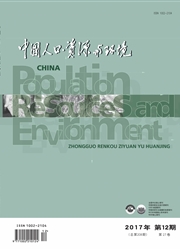

 中文摘要:
中文摘要:
市场机制引入是否可以提高城镇新增建设用地配置效率优化城镇新增建设用地配置体系是学界和政界关注的热点问题。本文以实施"地票"交易政策,尝试引入市场机制配置城镇新增建设用地的重庆市为典型区域,结合理论分析与实证检验,通过构建以Logit模型为基础的"地票"指标流转模型,利用重庆市2008—2012年38个区县的"地票"交易数据,定量分析"地票"指标市场化流转行为及其关键影响因素,从而探究市场机制引入对城镇新增建设用地配置效率的影响。研究结果表明,重庆市各区县城镇建设用地边际产出与区域"地票"指标的流入行为存在正向的作用关系,而与"地票"指标的流出行为存在负向的作用关系。在市场机制的作用下,市场上的"地票"指标主要由城镇建设用地边际产出较低的区域提供,而"地票"指标最终流入了城镇建设用地边际产出相对较高的区域,从而拉平了区域之间城镇建设用地边际产出,一定程度上提高了城镇新增建设用地配置效率。为此,认为伴随着"地票"交易政策的实施,重庆市逐步形成了一种计划配置为主、市场配置为辅的混合型城镇新增建设用地配置体系,这种配置体系极大地增加了指标供给的弹性并优化了指标的配置效率。因此,我国应积极尝试在现有城镇新增建设用地配置体系中引入市场机制,引导地方政府从"增量"、"计划"的用地理念逐步向"存量"和"市场"的用地理念过渡,最终形成以区域资源禀赋和实际需求为导向的城镇新增建设用地配置体系。
 英文摘要:
英文摘要:
Whether the introduction of market m e c h a n i s m c a n improve the efficiency of n e w urban construction land is the hot issue inacademic and political areas. Taking C h o n g q i n g, where the ‘ L a n d Ticket Trading ’ policy is implemented to attempt to introduce market mechanism to allocate n e w urban construction land,as an e x a m p l e,establishing the ‘ L a n d Ticket’ transfer model based on the theoretical analysis a nd applying the ‘ L a n d Ticket Trading ’ data of 38 districts from 2008 to 2012,this paper empirically analyzes the* Land Ticket ’ transfer behavior and its critical influencing factors,so as to explore the effect of the introduction of market m e c h a n i s m on the allocative efficiency of n e w construction land. Results s h o wthat there is a positive relationship between the marginal output of urban construction land and ‘ L a n d Ticket ’ inflow,but the relationship between the marginal output of urban construction land and* land ticket’ outflow is negative. U n d e r the market m e c h a n i s m,the ‘ L a n d Ticket’ is mainly provioutput of urban construction land,a nd eventually flows into regions with higher marginal output of construction marginal output of urban construction land between regions,and to a certain extent,improving the allocative construction land. To this end, this paper argues that with the implementation of the ‘ land ticket trading ’ policy, Chongqing has gradually formed a mixed n ew urban construction land allocation system,with plan allocation based a nd supplemented by market allocation,which greatly increases the flexibility of the supply of land quotas and optimizes the Therefore,China should actively introduce the market m e c h a n isminto the existing n e w urban construction land allocation system,guidethe local government to shift land use concept from * incremental ’
 同期刊论文项目
同期刊论文项目
 同项目期刊论文
同项目期刊论文
 期刊信息
期刊信息
